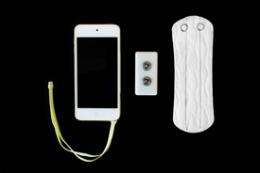Familiar consumer electronics are used to help toilet-train children with autism

Proper bathroom habits, which most people take for granted, are an important quality-of-life issue for many children with autism and their families. A new device developed at the University of Rochester is showing promise of reducing the time and effort required to toilet-train children with autism and other developmental disabilities.
"We have research that shows it can take a family a year-and-a-half to toilet-train a child with autism or other developmental disability" said Daniel W. Mruzek, associate professor of pediatrics at the University of Rochester Medical Center. "In the initial pilot, our device drastically reduced that time to just a few weeks."
Mruzek and Stephen McAleavey, associate professor of biomedical engineering, used fairly common items to construct their toilet-training device: sterile pads, a sensor, a Bluetooth-enabled transmitter, and an iPod. They received some help from Dan Hansen, a freshman computer science major, who wrote the software for the project.
When a drop of urine is detected on a pad, a signal is sent to the iPod, triggering a sound or piece of music. At the same time, an alarm is activated on an iPod being worn by a teacher or caregiver, who can then assist the child in using the toilet. If the child successfully uses the facilities, the iPod offers up a reward in the form of a game, song, or photo.
Their toilet-training device is an upgrade from a model they developed six years earlier. "It originally had a larger pad and was based on a very rudimentary wireless technology with limited capabilities," said McAleavey. "This updated device is more comfortable, lasts longer, and allows us to incorporate more features, such as allowing progress reports to be emailed to the child's physician or other clinician."
The University of Rochester is collaborating with Vanderbilt University and Nationwide Children's Hospital on a new round of clinical testing, which has just gotten underway.
"As an increasing number of children are diagnosed with autism, we are increasing our efforts to include these children into the mainstream of everyday life," said Mruzek. "To our way of thinking, that makes it all the more important to break down the social barriers facing these children, including dependence upon others for bathroom needs."
















